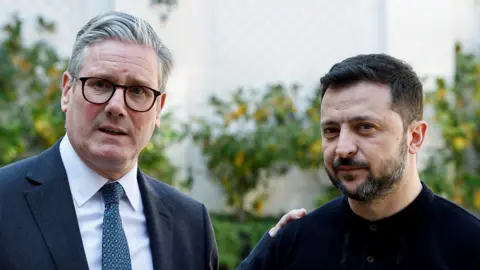On May 9, 2025, Prime Minister Sir Keir Starmer of the United Kingdom will join a coalition of world leaders in an urgent diplomatic mission to Ukraine. The primary objective of this initiative is to compel Russia to agree to a 30-day ceasefire amidst the ongoing war that has claimed countless lives and caused widespread destruction since its inception over three years ago. Starmer’s visit is particularly significant as it marks his second trip to Ukraine in his current capacity as Prime Minister.
Accompanying Sir Keir on this crucial visit are President Emmanuel Macron from France, Polish Prime Minister Donald Tusk, and the newly appointed Chancellor of Germany, Friedrich Merz. Their joint presence emphasizes a unified stance against Russian aggression and an insistence on peaceful resolution methods. This collaboration among European leaders aims to apply substantial pressure on the Kremlin to halt hostilities.
The ceasefire proposal is not new; it echoes a similar call made by former U.S. President Donald Trump. The leaders are seeking a comprehensive and unconditional ceasefire, which they believe is essential to create the necessary space for fruitful diplomatic negotiations aimed at a long-lasting peace deal in Ukraine.
Symbolizing their commitment to Ukraine, the unconditional visit to Kyiv stands as a counter to the display of solidarity shown by over 20 leaders in Moscow who gathered to observe Russia’s Victory Day celebrations just days prior. This timely visit encapsulates the leaders’ determination to project strength and solidarity, especially in light of the recent commemorations overshadowed by military conflict.
Throughout their diplomatic engagement, the leaders will meet with Ukrainian President Volodymyr Zelensky and participate in a virtual summit designed to reinforce a coalition of about 30 nations committed to strengthening Ukraine’s security in the event of a peace agreement with Russia. Additionally, they intend to honor the memory of Ukrainian soldiers who have made the ultimate sacrifice in the fight against the unlawful Russian invasion.
In a powerful message released prior to their arrival, the leaders stated that their visit symbolizes a commitment to stand united against the “barbaric” actions of Russia. They forcefully reiterated their responsibility to support President Trump’s call for a peace agreement and condemned Russia’s ongoing disruptions to paths leading to peace. Their statement emphasized the urgent need for a ceasefire, highlighting that the violence must come to a halt and expressing the unwavering support for a safe and sovereign Ukraine that can thrive within its internationally recognized borders.
As negotiations press on, the geopolitical stakes are escalating. Russia has declared a short-lived, three-day ceasefire to mark World War II Victory Day; however, this gesture has been dismissed by Ukraine as insincere—a “theatrical show” cloaked in hostility. Following the declaration, reports emerged of thousands of violations by Russian forces, further fueling tensions.
Chancellor Merz expressed optimism regarding a potential full ceasefire agreement within the weekend. The tentative three-day truce is set to conclude, yet Merz remarked that there could be a possibility for extension to 30 days, indicating that the onus is now on Moscow to comply with international demands for peace.
In conjunction with these developments, former President Trump reiterated his demand for an unconditional ceasefire in a conversation with Zelensky, cautioning that if Russia fails to respect the ceasefire, the U.S. and its allies would impose additional sanctions. This insistence on accountability underscores the international community’s resolve to end the violence and seek a long-term resolution to the conflict.
The collective efforts of these leaders shaped a hopeful narrative of solidarity and strategic alliance, as they navigate the complex landscape wrought by conflict in Ukraine. Only time will reveal whether their diplomatic endeavors will yield the desired results and peace can finally be achieved in the region.



